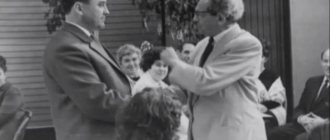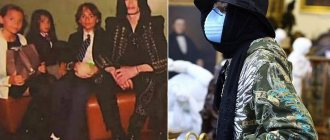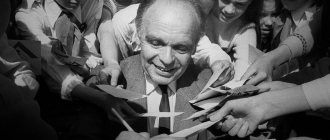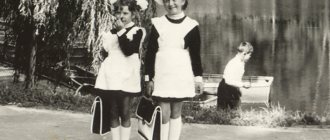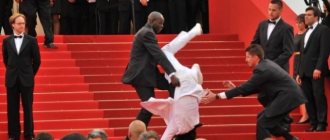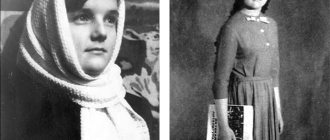Childhood and youth
Ida was born in Kazan on the eve of the Great Patriotic War. Parents moved to this city from Kyiv for work. The fact is that the girl’s father, Solomon Iosifovich, a Jew by nationality, was a professor of medicine and he was invited to lecture on dentistry at a local university. Subsequently, the works of Solomon Weiss were used as textbooks on dentistry in the country's medical universities. My mother, Elena Mitrofanovna Emelyanova, a surgeon by profession, also had a direct connection to medicine.
Ida grew up as an artistic, extraordinary girl. At an early age I was fond of dancing and did the splits. From the age of four she became familiar with the English language, studying with a governess who arrived from Shanghai. Later, upon graduating from school, I chose English, which I did not study officially at school, and at the same time passed the exam with excellent marks.
Posted by Igor Ivanov on Wednesday, February 24, 2021
Aida Vedishcheva in her youth
When their daughter was 10 years old, the Weiss family moved to Irkutsk. Ida, despite her parents’ professions, grew up surrounded by songs and creativity, since her mother’s relatives, who lived in the same apartment with the Weisses, played musical instruments well and constantly organized home concerts. Since childhood, the future pop star also fell in love with music. Ida graduated from music school and began playing on stage at the local Youth Theater and at the Irkutsk Musical Theatre.
At the insistence of her father and mother, the girl was forced to get a higher education at the Institute of Foreign Languages. And although Aida Vedishcheva studied there under pressure, the English and German languages she mastered came in handy later. Nevertheless, feeling like an artist at heart, Ida went to Moscow and submitted documents to the M. S. Shchepkin Higher Theater School. The applicant easily passed the multi-level exams, but was rejected at the last interview. The official reason was studying at the first institute.
Then Vedishcheva began her singing career. In her youth, Aida became a member of the Kharkov and Oryol Philharmonic Orchestras, was a member of the orchestras of Oleg Lundstrem and Leonid Utesov, and performed with the ensembles “Meloton”, “Blue Guitars” and the group “Singing Novels”.
Career in the USSR
The singer's fame gradually gained momentum, and in 1966 people started talking about the artist throughout the Soviet Union. Leonid Gaidai’s comedy “Prisoner of the Caucasus” was released, in which the heroine Natalya Varley, in the voice of Aida Vedishcheva, sang the light romantic hit “Song about Bears”. To record this song, the director called Vedishcheva from the Far East, where the vocalist was on tour. The record with this recording sold 7 million copies in the first days alone.
But the Soviet authorities considered the musical composition vulgar. The young singer was made “extreme”, and not the honored cultural figures (composer Alexander Zatsepin, poet Leonid Derbenev). After the comedy was released, it was discovered that Vedishcheva’s name was not listed in the credits. This was the first blow for Aida.
A year later, the solo composition “Geese, Geese” became a hit, which earned the performer a place as a diploma winner at the international music festival in Sopot, Poland, which was often compared to the earlier Eurovision contest. This event became a real test for the young participant. In the midst of a vocal competition, news spread across Poland that Soviet tanks had entered Prague.
Aida Vedishcheva - “Song about Bears” from “Prisoner of the Caucasus”
Calls immediately began to come from Moscow prohibiting Vedischeva from performing, out of fear that spectators sympathizing with the Czechs might boo the contestant. However, these orders did not stop the performer: Aida sang as an encore not only “Geese”, but several dance hits at once, causing delight among the audience. Such “disobedience” soon affected the vocalist’s future career: she was included in the black list of unreliable artists.
The “dislike” of the authorities intensified with the appearance of Leonid Gaidai’s comedy “The Diamond Arm” on screens. It featured the sensual composition “Volcano of Passions” (“Help Me”) with frivolous lyrics for that time. This tango performed by Vedishcheva was performed in the scene of seduction of the main character of the film, Semyon Gorbunkov. The film and song went viral, and the singer received another warning from the Ministry of Culture. On behalf of Ekaterina Furtseva, the artist received a telegram with the words “stop this disgrace.”
The composition “Comrade” became the anthem of the youth of the 70s, for the performance of which Vedishcheva received an award from the Komsomol. The author of this hit, Oleg Ivanov, was then an ordinary medical student and he himself brought the sheet music to the famous singer for review. The artist was not afraid to perform a hit song at the All-Union Competition of Young Composers, which was broadcast on the radio, and get first place for it. Later, the song joined Lev Leshchenko’s repertoire.
Aida Vedishcheva - “Forest Deer” from “Oh, That Nastya!”
Also adding to Aida’s popularity were the songs “Funny Boy”, “Bear’s Lullaby” from the children’s cartoon about the little bear “Umka”, “First Spring”, “I’ll Be Waiting for You” from the movie “White Piano” (where, as in “Prisoner of the Caucasus” , the vocalist’s voice “got” to actress Stalin Azamatova). But if listeners praised the singer’s talent to the skies, the authorities constantly created obstacles for the artist.
Vedishcheva was not allowed on television and was limited from concerts. Moreover, when the hit song “Forest Deer” became the winner in the popular program “Song of the Year,” the Big Children’s Choir of Central Television and All-Union Radio was invited to perform this composition instead of Aida. In the mid-70s, the name and photo of the artist completely disappeared from posters, and videotapes and magnetic recordings were demagnetized and destroyed. If Vedishcheva had not compiled her own discography archive, the famous songs would have been lost.
Songs
- Sea Devil
- Cranes (music by E. Hanok, lyrics by A. Dostal)
- Love (music by O. Feltsman, lyrics by N. Olev)
- Respond (music by S. Pozhlakov, lyrics by N. Malyshev)
- I will wait for you, 1968 (music by A. Zatsepin, lyrics by O. Gadzhikasimov)
- Comrade (music by O. Ivanov, lyrics by A. Prokofiev)
- You will still be mine, 1969 (music by A. Zatsepin, lyrics by L. Derbenev)
- You argued in vain (music by B. Savelyev, lyrics by V. Kharitonov)
- Farewell to Bratsk (duet with Yu. Puzyryov, music by A. Pakhmutova - lyrics by S. Grebennikov and N. Dobronravov)
- Come what may (music by Y. Frenkel, lyrics by M. Tanich)
- Steps on the grass (music by M. Legrand, lyrics by I. Reznik)
- Song about Dushanbe (from the film “White Piano”)
- Arithmetic, 1969 (music by V. Khvoinitsky, lyrics by N. Olev)
- Where are you rushing, 1968 (music by B. Savelyev, lyrics by L. Derbenev)
- Even or Odd, 1969 (music by V. Gamaliya, lyrics by I. Shaferan)
- Don't be born beautiful, 1970 (music by R. Mayorov, lyrics by O. Gadzhikasimov)
- Find me, 1969 (music by V. Khvoynitsky, lyrics by G. Beilin)
- Road, 1968 (music by A. Zatsepin, lyrics by O. Gadzhiksimov)
- Song about spring, 1968 (music by A. Zatsepin, lyrics by J. Ziskind)
- Song in an undertone, 1969 (music by S. Zaslavsky, lyrics by M. Plyatskovsky)
- Forest deer, 1971 (music by E. Krylatov, lyrics by Yu. Entin) - song from the film “Oh, this Nastya!”
- Ice, 1969 (music by A. Zatsepin, lyrics by L. Derbenev)
- Geese, geese, 1967 (music by S. Pozhlakov, lyrics by N. Malyshev)
- A man came up with a song, 1966 (music by I. Granov, lyrics by L. Derbenev)
- It’s just my age, 1970 (music by B. Savelyev, lyrics by M. Plyatskovsky)
- Old Garden (music by V. Mlinarsky, lyrics by L. Derbenev)
- My happiness was carried away by the sea (music by A. Dneprov, lyrics by A. Vedishchev)
- Make a wish (music by I. Granov, lyrics by D. Ivanov)
- I love you, Moscow (A. Abramova, L. Ivanova)
- The Witch (music by R. Mayorov, lyrics by O. Gadzhikasimov)
- Hope faith Love
- Song about bears, 1969 (music by A. Zatsepin, lyrics by L. Derbenev)
- Be with me as before, 1968 (music by V. Shainsky, lyrics by A. Nagornyak)
To movies
- “White Piano”
Road song (music by A. Zatsepin, lyrics by O. Gadzhikasimov) - First spring (music by A. Zatsepin, poetry by O. Gadzhikasimov)
- Song about Dushanbe (music by A. Zatsepin, lyrics by O. Gadzhikasimov)
- I will wait for you (music by A. Zatsepin, lyrics by O. Gadzhikasimov)
— Forest deer (music by E. Krylatov, lyrics by Yu. Entin)
- Song about bears (music by A. Zatsepin, lyrics by L. Derbenev)
- Help me, 1968 (music by A. Zatsepin, lyrics by L. Derbenev)
)
- Spring is music, 1968 (music by R. Mayorov, lyrics by A. Holguin)
To cartoons
- “Umka”
- “Lullaby of the Bear”, 1969 (music by Evgeny Krylatov, lyrics by Yuri Yakovlev) - “[www.youtube.com/watch?v=7LHlM2lDr_k And my mother will forgive me]”
- “[eslivamnravitsa.narod.ru/Retro/Pesni_50-60/Vedischeva/tovarisch.htm Comrade]”, 1970. The cartoon contains poems [lad-lad.ru/stihi/55-moshkovskaja/234-moshkovskaja.html%20Moshkovskaya%20Emma%20Efraimovna Emma Efraimovna Moshkovskaya] (inaccessible link since 03/15/2014 (2689 days)). Cartoon from 1975, director Anatoly Petrov, script: Genrikh Sapgir, Emma Moshkovskaya, cameraman Mikhail Druyan. Artists V. Gilyarova, Olga Bogolyubova, Elena Bogolyubova. Plot: Having quarreled with Mom, the Boy imagines himself going on an imaginary journey, but soon returns, realizing how bad it is to live without Mom. - Katerok - “Chunga-Changa” in a duet with Anatoly Gorokhov.
Emigration
Tired of constant humiliation and the inability to work normally, Aida decides to leave her homeland. On the threshold of her fortieth birthday, the singer was not afraid to begin a new stage in her creative biography. In 1980, she emigrated to the United States, where the vocalist benefited from her fluency in English.
The actress sat down at her desk again and studied at a theater college. Two years later she made her debut with a solo program at Carnegie Hall. Aida was produced by Joe Franklin, who previously worked with Liza Minnelli and Barbra Streisand. It is interesting that after the move, the artist changed her hair color - from a burning brunette, Vedishcheva dyed her hair to a blonde and remains so to this day.
Later, due to health problems, Aida left New York and moved to California, where she founded her own theater. The artist took the pseudonym Amazing Aida and managed to conquer a new country. In her new location, the artist often gave concerts at the fashionable Friars Club in Beverly Hills, where Frank Sinatra and Bob Hope had previously shone.
Aida Vedishcheva - “Help Me” from “The Diamond Arm”
Aida Semyonovna became the first pop singer from Russia to unconditionally conquer America. The vocalist specialized in Broadway musicals and wrote the music herself. The artist also performed Russian and gypsy romances and Jewish folk songs. Vedishcheva’s repertoire included hits in both English and Russian, these are songs of the late period “The Ballad of Chernobyl”, “Old Garden”, “I will be back, Moscow!”, “Life is music”, “Christmas”. In addition, Aida penned the musical “Masterpiece and Singing Freedom,” dedicated to the terrorist attack of September 11, 2001.
Songs performed by Vedischeva in the Soviet Union were released on large records and minions. The artist released her only retro-style disc in 2002 and called it “Somewhere in the White World.” The album includes 18 tracks that are already loved by the public. Later, clips began to appear that used footage from films and concert chronicles of the 60s and 70s.
In 2021, the play “The Thaw. Melodies of Fate”, dedicated to the work of three Soviet pop stars - Nina Brodskaya, Aida Vedishcheva and Larisa Mondrus. A year later, it became known that Aida donated two concert dresses, which she wore in the 1970s, to the Alexander Vasiliev Foundation, a fashion historian. One of them was sewn according to Boris Messerer's design by Bolshoi Theater tailors. In 2021, the documentary film “Legends of Music. Aida Vedishcheva."
Notes
- [popsa.info/bio/064/064b.html Two interviews]
- [www.krugozormagazine.com/main/archive/2007/07/aida-vedischeva.html Planid of Aida. Visiting KRUGOZOR magazine - Russian pop legend Aida VEDISHCHEVA]
- [www.vmdaily.ru/article.php?aid=1495 Svetlana Fedotova, Fedor Razzakov.
“And I will think!” / “Evening Moscow” No. 149 dated 08/12/2004] link verified March 25, 2009 - Razzakov F.I.
The death of Soviet TV: Secrets of television: From Stalin to Gorbachev. 1930-1991. - M.: EKSMO, 2009. - [www.youtube.com/watch?v=vtKKUpoYOgg&t=50m50s Final broadcast “Song-73”]
- Razzakov F.
Behind the scenes of show business. - M.: AST, 2004. - P. 193. - 942 p. - [www.mk.ru/culture/cinema/article/2008/12/01/10197-amerikanskaya-ariya-aidyi-vedischevoy.html American aria by Aida Vedischevoy. - “Moskovsky Komsomolets”, No. 24927 dated December 1, 2008]. www.mk.ru. Retrieved June 17, 2021.
- [www.tv-ostankino.ru/material/Material_1328_42.htm “Idols” program]. (inaccessible link from 03/15/2014 (2689 days) - history
,
copy
) - [www.youtube.com/watch?v=jl6FzuK5u7w Aida Vedishcheva. Somewhere in this world... (documentary film, scriptwriter: Yakov Dashevsky, director: Elena Solovyova, released: Russia, “GoldMedium”, year of release: 2006].
- ↑ 123
"Sounds of Aida". Konstantin Ioch. "Rossiyskaya Gazeta" No. 244 (4801) dated November 23, 2008
Personal life
The personal life in the artist’s biography recalled that “volcano of passions” about which she sang. Ida Weiss got married for the first time at the age of 20. The singer's husband was a circus artist, acrobat Vyacheslav Vedischev. The husband gave Aida a new surname, and the artist herself added one letter to her name in order to try to avoid the anti-Semitic sentiments then reigning in the leadership of the Soviet State Concert. In her first marriage, Aida had her only child, a son, Vladimir. But life with Vyacheslav did not work out for the artist, since the young people were different people.
The second husband, Boris Dvernik, worked as a pianist and led the Meloton ensemble, in which the singer performed. Despite the fact that Aida was 9 years older, the couple got along well and separated on the other side of the ocean. Moreover, the artist still cannot explain even to herself why. Dvernik later committed suicide.
Aida Vedishcheva (Amazing Aida) sings in English
When Vedishcheva was 45 years old, the singer married again. The new chosen one was millionaire Jay Markaff, a Pole by origin, 15 years older than her. During the first years, Aida enjoyed her vacation, but then she wanted to return to her singing career. The husband turned out to be against it, the union began to crack at the seams, and they separated. True, the divorce process was difficult and lasted three years.
In the early 90s, doctors discovered the famous singer had stage 3 stomach cancer. This was already an advanced stage, and Vedischeva was not recommended to undergo surgery. But Aida, who was supported by only one friend, Israeli businessman Naim Bejim, insisted on her own. The singer underwent surgery, underwent a course of chemotherapy, and in the end the disease was defeated. After the tragic events she experienced, Vedishcheva married the one who was next to her all this time - Naim Bedzhim. The couple are still happy together.
Links
- [karradio.ru/articles/113/ Interview with Nezavisimaya Gazeta]
- [pressa.irk.ru/kopeika/2006/05/009001.html Aida Vedishcheva - singer behind the scenes] (“Kopeika”, February 10, 2006)
- [www.mk.ru/blogs/MK/2002/03/25/archive/140188/ Somewhere in this world...] (“Moskovsky Komsomolets”) (inaccessible link from 06/18/2016 (1863 days) - history
) - [www.radiorus.ru/issue.html?iid=129528&rid=352 Aida Vedishcheva: no one wanted to leave] (Radio Russia)
- [sobesednik.ru/culture/chetyre-muzha-aidy-vedishchevoi Four husbands of Aida Vedishcheva] (“Interlocutor”)
- [vmiremusiki.ru/aida-vedishheva.html Aida Vedishcheva: “Don’t be afraid to start from scratch”]

